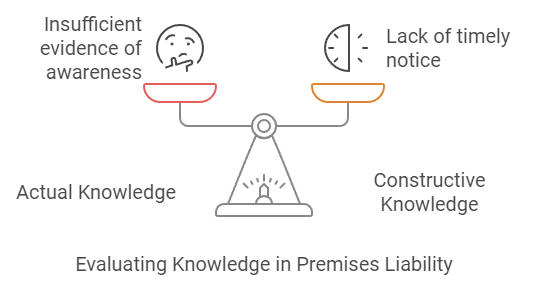In a story familiar to many retail customers, Robert Lee Weathered visited a Family Dollar store in Dallas, Texas, and experienced a slip-and-fall accident that led to significant legal proceedings. This case provides an important example of premises liability, a legal concept that holds property owners accountable for maintaining safe environments for their visitors.
It underscores the importance of legal representation in navigating such complex situations. Joe I. Zaid & Associates, a personal injury law firm, specializes in these cases and stands ready to offer their expertise to individuals who have been injured under similar circumstances.
The Incident in Dallas
On May 24, 2021, Robert Lee Weathered entered a Family Dollar store located at 200 E. Camp Wisdom Rd. in Dallas, Texas. While walking through the store, Weathered unfortunately slipped and fell in a mysterious liquid, leading to a knee injury that required medical attention. This accident became the foundation of a legal battle over premises liability, a serious consequence of seemingly mundane everyday accidents. Weathered’s fall serves as a poignant reminder of the potential hazards present in public spaces and the importance of vigilant safety standards.
What is Premises Liability?
Premises liability is a legal principle that seeks to hold property owners responsible for accidents and injuries that occur on their premises due to unsafe conditions. In this context, the main issue was whether Family Dollar knew or should have known about the liquid hazard that led to Weathered’s injury. In legal terms, this is referred to as “actual or constructive knowledge” of the dangerous condition.
For a successful premises liability claim, the injured party must prove:
- The property owner had knowledge of the dangerous condition.
- The condition posed an unreasonable risk of harm.
- The owner did not take adequate measures to prevent or address the hazard.
- The owner’s negligence was directly responsible for the injury.
The Legal Proceedings
Weathered initially filed the premises liability case against Family Dollar in Dallas County state court. Family Dollar then moved the case to federal court, citing diversity jurisdiction based on the parties’ differing state citizenships – Weathered is a Texas citizen, while Family Dollar’s corporate citizenship is in Virginia.
In seeking summary judgment, Family Dollar argued that they lacked the necessary knowledge of the spilled liquid to be held liable under premises liability law. Weathered, on the other hand, disputed this, submitting various pieces of evidence, including his testimony and an email from Family Dollar’s claim examiner, suggesting the issue of a leaking roof could have been a contributing factor.
Evidence Consideration and Rulings
The court found itself scrutinizing several pieces of evidence. Weathered’s reliance on his testimony was scrutinized as self-serving, yet the court determined such evidence couldn’t be dismissed on that basis alone. The critical issue was whether Weathered’s evidence demonstrated actual or constructive knowledge by Family Dollar – in other words, did Family Dollar know about the slippery hazard, or should they have known about it?
Another complex aspect of the proceedings was the discussion around evidence described as missing or potentially destroyed, which led Weathered to suggest possible evidence spoliation. However, without clear evidence of intentional destruction of evidence by Family Dollar, Weathered’s claims of spoliation did not hold at this stage of the proceedings.
Core Findings
Ultimately, the court decided in favor of Family Dollar, granting their motion for summary judgment. The court’s decision highlighted that:
- Actual Knowledge: Weathered’s proofs, including the claim that Family Dollar employees had previously cleaned up the affected area, were not enough to establish that Family Dollar knew about the specific hazard before his fall. Past clean-ups did not equate to actual knowledge of the persistent danger.
- Constructive Knowledge: The evidence submitted failed to demonstrate that the liquid was present long enough for Family Dollar to notice and rectify the condition.
This ruling, based on the specifics of the evidence, underscores the complexities of pursuing a premises liability case. It shows why expert legal counsel is vital in gathering evidence and constructing a comprehensive and compelling argument.
Seeking Legal Assistance
If you have experienced a situation similar to Weathered’s while shopping at Family Dollar or any other retail store in Dallas or elsewhere, it is crucial to understand your rights and legal options. With the expertise of Joe I. Zaid & Associates, you can gain clarity on premises liability law and how it might apply to your case. Their dedicated team, based in Pasadena, Texas, serves clients who need compassionate, knowledgeable legal representation to seek the just compensation they deserve.
Our Commitment to Justice
At Joe I. Zaid & Associates, our primary focus is ensuring that our clients are treated fairly and receive due compensation for their injuries and losses. For those facing the aftermath of premises accidents, like a slip-and-fall, navigating the legal system can be daunting without skilled guidance. Allow our team to support you through each step of this challenging journey, advocating for your best interests with integrity and precision.
Contact Information
For consultation and more information, you can reach us at:
Phone: (346) 756-9243
Fax: 866-563-9243
Address: 4701 Preston Ave, Pasadena, TX 77505
Website: Joe I. Zaid & Associates
Disclaimer: This analysis refers to an actual case example from casetext.com but does not represent a case handled by our firm. It serves as an illustration of similar types of cases we specialize in handling. Always seek personalized legal advice from a qualified attorney regarding your unique circumstances.


